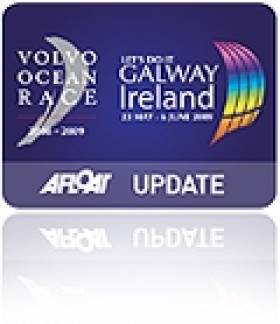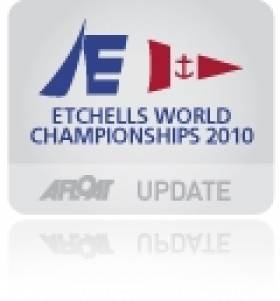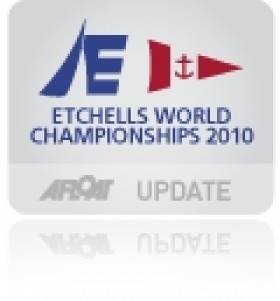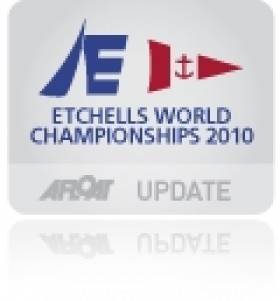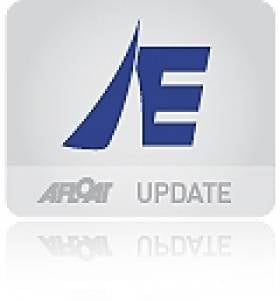Displaying items by tag: John Bertrand
VOR Skipper Cammas Receives French Sporting Honour
Volvo Ocean Race skipper Franck Cammas has been presented with one of France’s most prestigious sporting honours.
The man in charge of the Groupama sailing team was awarded the Grand Prix de l’Académie des Sports in Paris recently, recognising his achievements in sailing in 2010.
These included his skippering of the 100ft trimaran Groupama 3 non-stop around the world in a record-breaking in 48 days, 7 hours, 44 minutes and 52 seconds.
Cammas is only the fifth sailor to be presented with the award, following Whitbread Round the World Race skipper Eric Tabarly, 1983 America’s Cup winner John Bertrand, solo sailor Isabelle Autissier and Alinghi team principal Ernesto Bertarelli.
But Cammas isn't resting on his laurels, as he's currently preparing with his team to compete in the next Volvo Ocean Race kicking off next month.
He will lead a crew of 11 sailors - including Kerryman Damian Foxall - on the 70ft monohull Volvo Open 70 Groupama 4 in the 39,000 nautical mile race, which is set to conclude in Galway next summer and will also involve Wexford sailor Justin Slattery, who is in the crew for Team Abu Dhabi.
The action starts in Alicante, Spain on 29 October with the first in-port race. The first leg to Cape Town then begins on 5 November.
BERTRAND WRAPS UP ETCHELLS WORLD TITLE
Australian sailing legend John Bertrand and his crew Andrew Palfry and Tom Slingsby wrapped up the 2010 Etchells World Championship title in some style at Howth (Saturday 28th) with his fifth bullet in eight races and without even needing to sail the final race of the Fingal County Council-sponsored series.
The Royal Brighton Yacht Club crew remained totally focused throughout the regatta and five firsts represented a stunning level of consistency at this level. Nearest rival Ante Razmilovic suffered gear problems before the start of the first race of the final day which forced them ashore to effect repairs. Fortunately for them, there was a general recall which gave them time to reach the re-start on time but they had a poor race to finish mid-fleet. With Bertrand taking line honours again, it was all over for the Royal Hong Kong YC team.
For Bertrand, it is the fulfilment of a dream to win a one-design class world championship to add to his Olympic bronze medal of 1976 and his famous America's Cup triumph 27 years ago. He practised on the race track for weeks before the event and his attention to detail was phenomenal, so the eventual outcome was the result of exceptional planning allied to technique, tactics and sheer sailing skill by the Aussie trio. Crewman Tom Slingsby had to forego the prize-giving dinner since he had to leave for the Laser Worlds at Hayling Island starting the next day.
In the morning race, Britain's Julia Bailey enjoyed the first beat, leading Bertrand around the top mark in a fresh 20-knot+ northerly but the Australians' superior downwind speed quickly saw that advantage wiped out. Bailey lost several places on the next leg and eventually finished 9th. Bertrand continued to stretch his lead while others swapped positions over the next two legs, with second place going to a very happy Tim Patton of Bermuda for his best result of the event. Jud Smith (Eastern YC/NYYC) and Peter Duncan (American YC) filled the next two places, with Smith the leading US entry in 7th overall going into the final race. Best of the Irish contingent was Howth's Laura Dillon on 'Lambay Rules' in 12th spot.
Irish eyes were smiling early and late in the final race, firstly with Jay Bourke of the Royal St.George YC heading the fleet around the windward mark followed closely by Peter Duncan of the USA and Howth's Dan O'Grady in 6th. By the leeward gate, another American Jud Smith had jumped from 7th to take the lead from Bourke, with O'Grady moving up another place. Smith held the lead to the finish, his win being the best score for a US team in an otherwise average week for American competitors. By the next windward mark, O'Grady had 3rd spot and by the finish, he had secured second place to record the best Irish result of the week. It was also sufficient to move O'Grady, with crewmen Peter Reilly and Owen Meade, up to 15th to finish top Irish boat of the championship, one place ahead of the Burrows family.
The new World Champion John Bertrand described the event as 'a superbly organised championship' and paid tribute to the Organising Committee chaired by Berchmans Gannon who was the first person to congratulate the Australians when they arrived back to the Howth marina. Throughout the Etchells Worlds, Howth Yacht Club provided comprehensive online coverage of the competition through live racing updates from the water via Twitter, provisional results posted online within 30 minutes of race finishes, and daily news updates with regular image and video posts.
The online coverage generated over 370,000 hits on the official Etchells Worlds website, with daily hits peaking at 59,194 for a single day. Australia, Great Britain and the USA provided the top number of hits although visitors identified from over 50 separate countries emphasized the worldwide demand for online coverage. Twitter helped incorporate the social networking element into the online coverage and the number of unique daily visitors to the Worlds website has grew by over 55% throughout the week.
Etchells World Championship – overall places:
1st John Bertrand/Andrew Palfry/Tom Slingsby (Australia) – 23 points 2nd Ante Razmilovic/Mike Wolfs/Chris Larson (Britain) – 35 points 3rd Damien King/Simon Cunnington/Andy Butler/James Ware (Australia) – 48 points 4th Eamonn O'Nolan/John Gimson/Kinley Fowler/Rachel Williamson (Britain) – 55 points 5th Jake Gunther/John Collingwood/Ben Morrison-Jack (Australia) – 55 points 6th Jud Smith/Kurt Winklemann/Brad Boston (USA) – 61 points
Bertrand maintains hold on Etchells Worlds
John Bertrand's dominance of the Etchells World Championships at Howth Yacht Club continued on day 4 of the regatta with a win in the afternoon race after scoring a disappointing 9th earlier in the day. His lead, however, has been trimmed back by his main rival Ante Razmilovic whose 4th and 5th places have closed the gap to 7 points after discards The other Razmilovic – Nils – had mixed fortunes on the day and lies third overall, a further seven points adrift.
The Championship, sponsored by the local Fingal County Council, has three more races on the schedule, two on Friday and one on Saturday, with only one discard allowed for the 9-race series, underlining the need for consistency at this level. Four wins in six races by Bertrand is undoubtedly exceptional consistency!
The 42-boat fleet faced a freshening north-easterly for the start of Race 5, sailing in18 knots of wind and a choppy sea. Nils Razmilovic of the Royal Swedish YC (sailing for Singapore) enjoyed the conditions to lead from the first windward mark to the finish. He was followed at various stages by his brother Ante, Eamonn O'Nolan of the RORC, Jake Gunther of Royal Brighton YC and Julia Bailey of Royal Thames YC.
Somewhat surprisingly, series leader John Bertrand could not keep with the pace and indeed slipped from 5th to finish 9th, a disappointing result by his standards and one which he will no doubt hope to be his discard. Despite that setback, he still held a 6-point lead in the overall standings after the fifth race.
It was a good day for the British contingent, filling the next three places, with O'Nolan securing his best placing in 2nd spot and Julia Bailey taking a well-earned third while Ante Razmilovic's 4th was enough to retain 2nd overall, tied on points with his brother.
As if to exorcise the ghosts of his 9th place in the previous race, Bertrand got back to winning ways in the sixth race to extend his overall lead, although he left it late. He was behind the ever-improving Julia Bailey at each mark rounding but on the final beat – shortened earlier because of dropping wind strength – he pulled ahead of the Royal Thames helm by the finish.
Damien King of Australia, never out of the top three throughout the race, held on to that slot, with Eamonn O'Nolan completing a satisfying day with a 4th to add to his earlier 2nd. Ante Razmilovic had to settle for 5th while 6th for Marvin Beckmann of Houston represented the equal best American result in the series so far.
For the Burrows family – Richard on helm with son David and daughter Samantha crewing - seventh was an encouraging result, maintaining their 11th place on the leader-board and consolidating their position as the leading Irish boat.
Etchells World Championships – overall placings after 6 races:
John Bertrand (Australia) - 9 points Ante Razmilovic (Britain) – 16 points Nils Razmilovic (Singapore) – 23 points Damien King (Australia) – 24 points Jake Gunther (Australia) – 25 points Graham Bailey (Britain) – 36 points
Follow the event on Twitter on the Championship website – www.etchellsworlds2010.org
Bertrand double at Howth to lead Etchells Worlds
Two bullets give Australian crew 11 point lead after four races
John Bertrand of Royal Brighton YC in Melbourne gave a masterclass on the waters off Howth to win both races in today's Etchells World Championships, sponsored by Fingal County Council, to open up a significant lead over main rival Ante Razmilovic of the UK.
With crewmen Andrew Palfry and Tom Slingsby, the Australian legend won the first race in light airs and when the wind strength increased, for the second race, their downwind speed in particular was outstanding. Three Australian crews are now in the top five.
Lack of wind early in the day forced an hour's postponement and although light 7-8 knot easterlies prevailed for the duration of the 2-hour race, it was more than adequate for the 41-boat fleet. The championship pace-setters Razmilovic and Bertrand again showed the way, this time with the Melbourne crew notching their second win of the series. Razmilovic's second place put him and Bertrand level on 7 points to extend their position at the top of the leaderboard after three races.
It was a good morning for the European Champion Jay Bourke and crew on 'Northside Dragon' from Howth. They were consistently in the top five for the whole race and claimed third spot by the finish for their best result so far. The next best of the Irish were David Burrows and Dan O'Grady in 12th and 16th places respectively
2009 Worlds runner-up Damien King of Australia, third overall going into the race, had to settle for 9th, a result which allowed the UK's Graham Bailey (5th in the race) to narrow the gap just one point. Nils Razmilovic (Singapore) scored a 6th to move within a point of Bailey.
An increase in wind strength had been forecast for the afternoon and by the start of Race 4, a 10-knot easterly greeted the fleet. It was an Aussie 1-2-3 at the first windward mark with Damien King, Bertrand and Jake Gunther leading the pack but Bertrand's downwind speed gave him the lead by the leeward gate, an advantage which he extended as the race went on.
Laurence Mead of Royal Corinthian YC was in contention throughout the race, finishing a good 2nd ahead of Gunther, Nils Razmilovic (Singapore) and King in 5th. Eighth and ninth for David Burrows and Dan O'Grady represented the leading Irish finishers, with Burrows moving up to 11th in the overall standings. Three points separating 2nd from 4th illustrates how tight the competition is in this premier one-design class
Two races are scheduled for Thursday (26th) with a forecast for stronger wind conditions
Etchells World Championships – after 4 races:
John Bertrand – Australia – 8 points Ante Razmilovic – Britain – 19 points Damien King – Australia – 21 points Nils Razmilovic – Singapore – 22 points Jake Gunther – Australia – 30 points Graham Bailey – Britain – 32 points
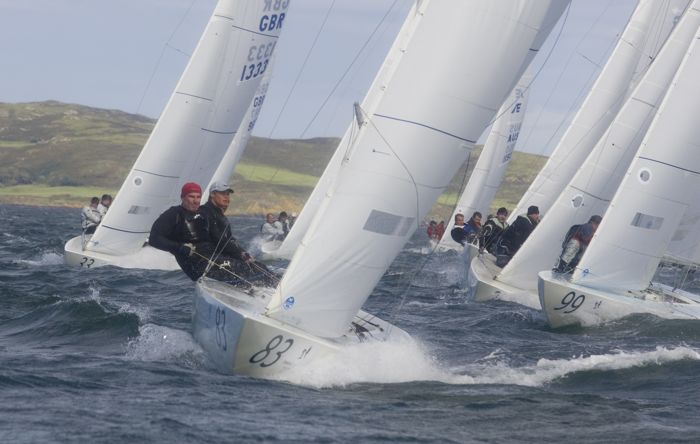
John Bertrand leading a race in Howth
International Dimension to Etchells Nationals
There is a distinctly international flavour to this year's Etchells National Championships sponsored by Euro Car Parks at Howth Yacht Club next weekend (August 14th & 15th), which is hardly surprising with the World Championships taking place at the same venue a week later. Fourteen entries from the USA (3), Australia (5) and UK (6) will be joined by local boats for the three-day event.
Among the major contenders will be America's Cup legend John Bertrand, fellow Australian and former World Champion Peter McNeill and leading American Argyle Campbell from Newport Harbour YC. Ante Razmilovic, from Royal Hong Kong YC, a regular visitor to Howth and the defending champion, will be another one to watch as the overseas crews familiarise themselves with the Howth waters ahead of the big event starting on August 23rd.
Leading the local challenge will be Dan O'Grady on 'Kootamundra Wattle', Richard & David Burrows on 'Matatu Dubh', Simon Knowles on 'Jabberwocky' and Laura Dillon on 'Key Capital' and their respective crews, all from the host club. The three-day event involves 6 races on windward-leeward courses and the race officer will be David Lovegrove who will also be the PRO for the forthcoming Worlds.


























